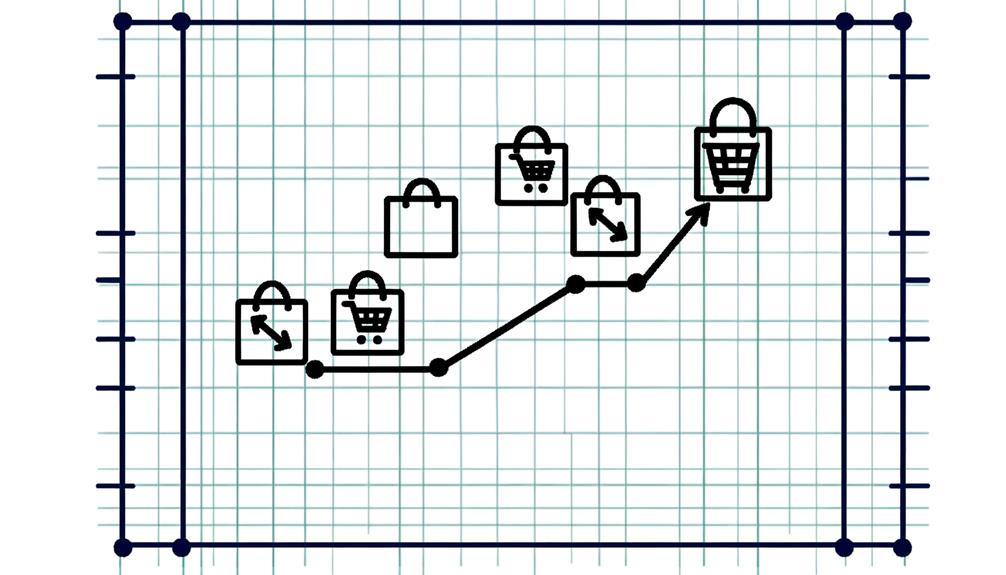The realm of e-commerce presents a vast array of solutions for your online store, each with its own unique features and benefits. Selecting the optimal platform is pivotal for your store’s success, as it can significantly impact your operations and customer experience.
Factors such as scalability, product diversity, integration capabilities, and pricing should be weighed carefully. From Shopify to WooCommerce, the choice is wide and nuanced. Thus, an in-depth comparison of these platforms is imperative to identify the solution that can effectively support your online business growth.
Key Takeaways
Understanding E-commerce Platforms
Examining the landscape of e-commerce platforms such as Shopify, BigCommerce, and WooCommerce offers a clear understanding of the myriad tools and features these platforms provide, catering to a range of business needs from small startups to large enterprises, while factoring in key considerations like user-friendliness, integration capabilities, pricing structure, and support features. These platforms deliver a holistic solution for businesses to establish an online store, manage products, and process orders effectively, thereby fostering the growth of online sales.
The inherent flexibility of these platforms allows businesses to customize and scale their operations according to their needs. Their user-friendly interfaces make them accessible to a wide range of users, even those with minimal technical skills. Further, their robust integration capabilities enable seamless connectivity with a plethora of third-party applications, enhancing operational efficiency.
Pricing plans vary across platforms, offering options suitable for different business sizes and budgets. Lastly, the support features, including 24/7 customer service and extensive knowledge bases, ensure that businesses can troubleshoot problems and optimize their online stores for success. Thus, understanding these platforms’ features is crucial for businesses seeking to maximize their digital presence and online sales performance.
Top E-commerce Solutions Overview
Building on the comprehensive understanding of e-commerce platforms, it is imperative to critically analyze the top e-commerce solutions such as Shopify, BigCommerce, WooCommerce, and Wix, among others, to identify their unique offerings, pricing structures, and how they cater to diverse business needs.
Shopify, a highly sought-after eCommerce platform, ranges from $29 to $299 per month offering robust inventory management. BigCommerce, starting at $29 per month, provides an array of payment gateways catering to a broad audience. WooCommerce is a free plan WordPress plugin with extensive payment options, a haven for small business owners looking for cost-effective solutions. Lastly, Wix, an affordable website builder, offers plans starting at $23 per month, ideal for small stores and boutiques.
| E-commerce Platform | Starting Price per Month | Noteworthy Feature |
| Shopify | $29 | Inventory Management |
| BigCommerce | $29 | Diverse Payment Gateways |
| WooCommerce | Free | Cost-effective for Small Businesses |
| Wix | $23 | Ideal for Small Stores |
Comparing E-commerce Platform Features

In the realm of e-commerce platforms, the distinct features offered by Shopify, BigCommerce, WooCommerce, and Wix present a diverse array of solutions tailored to a variety of business needs, each with its unique advantages and limitations.
The selection of the right e-commerce platform should be based on your specific business needs, considering the features that each platform offers.
Pricing of E-commerce Platforms
Understanding the cost structure of e-commerce platforms is crucial as it can vary significantly, ranging from free options to several hundred dollars per month. Additional transaction fees and potential charges for not utilizing preferred payment gateways can also add to the overall cost.
eCommerce platform pricing is not only about upfront costs. The monthly costs, the transaction fees, and the fee structure all play a significant role in determining the total cost. For instance, selling 10 T-shirts at $50 each could total around $56.50 per month, given a typical transaction fee of 2.9% plus a fixed amount of $0.30 per transaction. This cost can increase if the platform charges additional fees for not using their preferred payment gateway.
Moreover, the total cost of operating your online store will also depend on your volume of sales. Platforms often have pricing tiers that correlate with the volume of transactions processed, so increased sales volumes can lead to higher fees.
Free E-commerce Solutions

When exploring e-commerce solutions, several platforms provide cost-effective options by offering free services with a wealth of customizable features, eliminating the burden of upfront investment and ongoing transaction fees. These platforms not only provide the essential tools for online store management but also a level of scalability and flexibility that caters to your growing business needs.
As a result, these free e-commerce solutions offer an avenue for businesses to create an online presence with minimal financial risks, while also enjoying a host of features for a tailored customer experience.
Ideal E-commerce Platforms for Large Sellers
While free solutions cater to the needs of startups and small businesses, larger sellers often require more comprehensive platforms, such as BigCommerce, which is designed to support high-volume sales and extensive inventories. BigCommerce, a preferred choice for large sellers, offers pricing plans starting at $29 per month. Its features include unlimited products and bandwidth, making it suitable for businesses with extensive inventories.
BigCommerce stands out as a value-driven solution, with no additional transaction fees, making it an economic option for high-volume sellers. Supporting over 55 payment gateways, it ensures flexibility and convenience for large-scale operations. Particularly, for private label B2C businesses, BigCommerce presents a scalable solution providing significant value.
Here is a breakdown of its offerings:
| Features | BigCommerce | Ideal For |
| Pricing Plans | From $29/month | Large Sellers |
| Unlimited Products & Bandwidth | Yes | Businesses with Extensive Inventories |
| Transaction Fees | No | High-Volume Sellers |
| Payment Gateways | Over 55 | Flexible Operations |
E-commerce Solutions for WordPress Users

In the realm of WordPress, several e-commerce plugins have gained prominence, delivering robust solutions for online businesses. These tools not only streamline the online sales process but also fortify the payment security of the store.
The ensuing discussion will shed light on top WordPress e-commerce plugins, methods to streamline the online sales process, and strategies to enhance the store’s payment security.
Top WordPress E-commerce Plugins
Given the significant market presence of WordPress, powering over 40% of all websites, it has become a popular platform for e-commerce, with a variety of powerful plugins available to enhance functionality and streamline online operations.
These popular plugins can transform a standard WordPress site into a fully operational online store, enabling businesses to thrive in the digital marketplace.
Streamlining Online Sales Process
Implementing a streamlined online sales process is a critical aspect for any WordPress user intending to establish a successful e-commerce platform, and WooCommerce, a popular solution, offers various essential features that aid in effectively managing inventory, shipping, returns handling, and payment gateways.
WooCommerce provides customizable themes and integrated sales channels, enabling WordPress users to set up a professional online store. The table below details some key features of WooCommerce:
| Feature | Benefit |
| Customizable Themes | Enables unique branding |
| Integrated Sales Channels | Streamlines the selling process |
| Payment Gateways | Facilitates smooth transactions |
| Inventory Management | Simplifies product tracking |
| SEO-friendly | Enhances online visibility |
Through WooCommerce, WordPress users can leverage flexibility and scalability, making the online selling process efficient and user-friendly. This fosters a sense of belonging among customers, further boosting business success.
Enhancing Store’s Payment Security
While WooCommerce’s features significantly streamline the online sales process, enhancing your store’s payment security remains a paramount concern for WordPress users venturing into the e-commerce space.
E-commerce Platforms for Business Websites

Navigating the landscape of e-commerce platforms for business websites, one encounters several robust options such as Shopify, BigCommerce, WooCommerce, and Wix, each offering distinct features and benefits tailored to the diverse needs of online stores.
Shopify, a widely-used eCommerce platform, is renowned for its user-friendly interface and comprehensive set of features. Its pricing plans start at $29 per month, which includes unlimited products and bandwidth, a boon for businesses with a large inventory or high traffic volume.
BigCommerce, on the other hand, is known for its scalability and strong SEO performance, critical for businesses looking to grow and improve their online visibility. Its plans start at $29.95 per month, ensuring affordability without compromising on features.
WooCommerce, a WordPress plugin, offers a high degree of customization options, ideal for small to medium-sized stores seeking to differentiate themselves. Despite being free, it provides a powerful e-commerce solution for WordPress sites.
Lastly, Wix, with all-inclusive pricing plans starting at $27 per month, is perfect for small businesses and boutiques desiring a straightforward, easy-to-manage online store.
Each platform has its strengths, and the choice depends on the specific requirements and budget of your online store.
Evaluating Enterprise E-commerce Websites
When assessing enterprise e-commerce websites, several key points merit close attention.
The initial choice of platform can significantly impact the functionality and adaptability of the online store, making this selection crucial.
Furthermore, considering the scalability of the website and the strength of its security measures will ensure that the platform can efficiently handle high traffic volumes while safeguarding sensitive data.
Selecting the Right Platform
In the realm of large-scale businesses, enterprise e-commerce websites stand as powerful tools, offering robust security, scalability, and customizable solutions that significantly enhance operational efficiency and customer experience.
Selecting the right platform is a strategic decision that requires a comprehensive understanding of the business model, customer needs, and long-term growth plans. A judicious choice will yield profitable returns, contributing to the overall success of your enterprise.
Ensuring Website Scalability
As your online business expands, ensuring the scalability of your enterprise e-commerce website becomes increasingly critical, warranting meticulous evaluation of server capacity, load balancing, and database optimization. Scalability is pivotal for handling high traffic and large volumes of transactions, thereby accommodating growth while preserving performance.
Utilizing content delivery networks (CDNs) and caching mechanisms can significantly fortify your site’s scalability, enhancing its capacity to efficiently serve more users. Moreover, scalability testing under varied conditions is crucial to pinpoint potential bottlenecks and optimize performance. This process helps your website to gracefully handle the demand surge during peak times without compromising the user experience.
Thus, prioritizing scalability is essential for your online store to thrive amidst growth and demand fluctuations.
Prioritizing Security Measures
Why is prioritizing security measures of paramount importance in evaluating enterprise e-commerce websites? The answer lies in the invaluable role these measures play in protecting sensitive customer information from cyber threats and data breaches.
Frequently Asked Questions
How Do I Find the Best Ecommerce Platform?
Identifying the best eCommerce platform involves evaluating platform features, cost, security measures, mobile compatibility, SEO friendliness, customer support, scalability, payment options, user experience, and integration capabilities, aligning them with your business needs.
Which Is the Best Ecommerce Platform to Launch an Ecommerce Store?
Choosing the best e-commerce platform involves comparing features like mobile optimization, payment gateways, shipping integrations, customization, customer support, SEO, social media integration, security measures, and pricing options among Shopify, BigCommerce, WooCommerce, Wix, and Square Online.
What Is the Best Platform to Build an Online Store?
The best platform for building an online store should excel in platform features, cost efficiency, customer support, mobile compatibility, security measures, SEO optimization, inventory management, payment integration, user experience, and shipping options.
What Is the #1 Ecommerce Platform?
Shopify, the #1 ecommerce platform, excels in user experience, platform pricing, security measures, customer support, mobile compatibility, customization options, SEO capabilities, payment processing, and social media integration, making it ideal for various online businesses.
Conclusion
In conclusion, selecting an ideal e-commerce solution is akin to finding the perfect cog to drive the wheel of your online business.
By carefully analyzing various platforms based on their features, pricing, scalability, and integration capabilities, one can identify the tool most suited to their business model.
This decision can significantly impact the growth trajectory of your online store, underlining the importance of a well-researched, deliberate choice of e-commerce solution.


